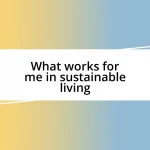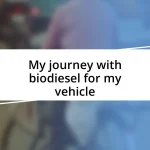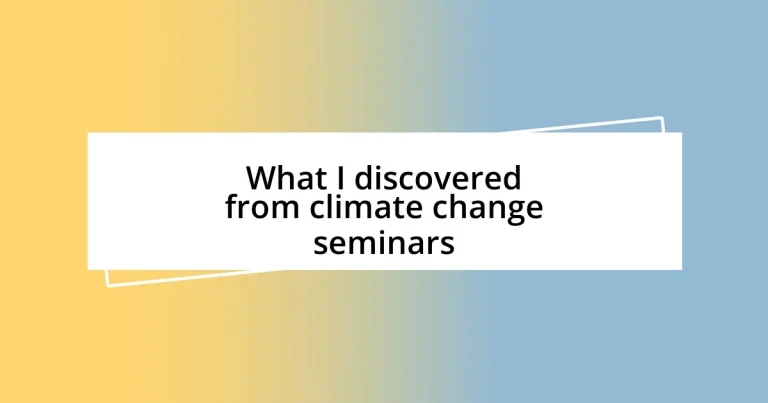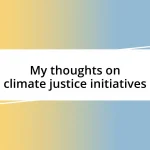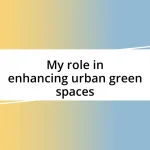Key takeaways:
- Attending climate seminars fosters personal connections and collective action, inspiring participants through real stories and shared experiences.
- Effective climate strategies include community engagement, awareness education, and supporting local policies to create significant environmental impacts.
- Future trends focus on technology-driven solutions, integration of indigenous knowledge, and community-driven renewable energy initiatives to enhance sustainability efforts.
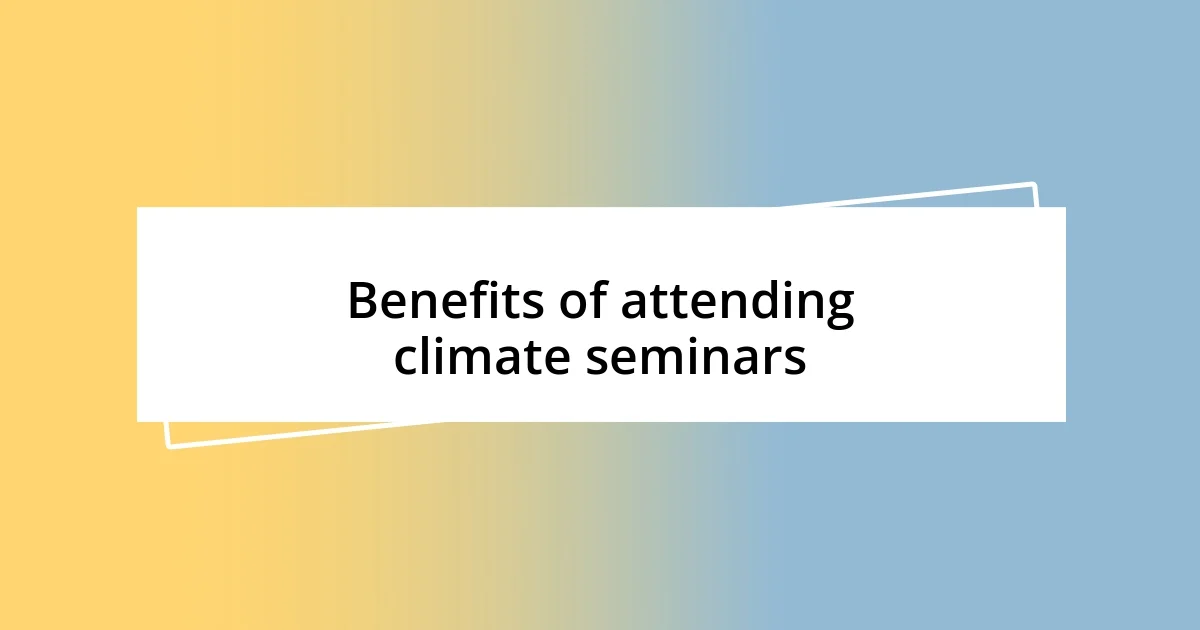
Benefits of attending climate seminars
Attending climate seminars has profoundly broadened my understanding of the complex layers surrounding climate change. I still remember one particular session where experts shared their firsthand experiences of climate-induced disasters. It made me question, how can we truly grasp the urgency if we’re not confronted with the real stories behind the statistics? Those narratives stirred something within me, igniting a passion to delve deeper into the topic.
Another significant benefit is the opportunity to connect with like-minded individuals. I vividly recall meeting an activist at a seminar who inspired me with her relentless determination and innovative solutions. Sharing ideas and discussing solutions in that environment fueled my motivation to take action. Isn’t it energizing to be part of a community that shares your concerns and aspirations?
Moreover, seminars often provide practical tools and resources that I found invaluable. During one session, I learned about community-led initiatives that I could apply in my own neighborhood. Understanding that small changes can have a ripple effect is empowering. Have you ever thought about how the knowledge gained from such events could elevate your ability to create impact?

Key insights from expert speakers
The speakers at the seminars brought a wealth of knowledge that was both enlightening and motivating. One expert recounted his journey through environmental law and the moment he realized the true power of legislation in combating climate change. I found myself nodding along, reflecting on how our political systems can either hinder or propel environmental progress. It really sank in how vital it is to advocate for policies that protect our planet.
I also appreciated the diversity of perspectives shared. A marine biologist spoke passionately about the impact of rising ocean temperatures on marine ecosystems. Hearing her describe the devastating effects on coral reefs hit me hard; it painted a vivid picture of loss and urgency. I realized that climate change isn’t just a distant threat—it’s happening now and affecting lives across the globe in ways we often overlook.
The practical strategies offered by experts were incredibly insightful. One speaker detailed a community project she spearheaded that transformed urban spaces into green areas, significantly improving air quality. Listening to her share firsthand successes made me think about similar initiatives I could encourage in my city. Have you ever pondered how local actions can lead to significant environmental benefits? It inspires hope when you see tangible outcomes.
| Speaker’s Area of Expertise | Key Insight |
|---|---|
| Environmental Law | Legislation is crucial for climate action. |
| Marine Biology | Rising ocean temperatures devastate marine ecosystems. |
| Urban Planning | Community-led green initiatives can improve air quality. |
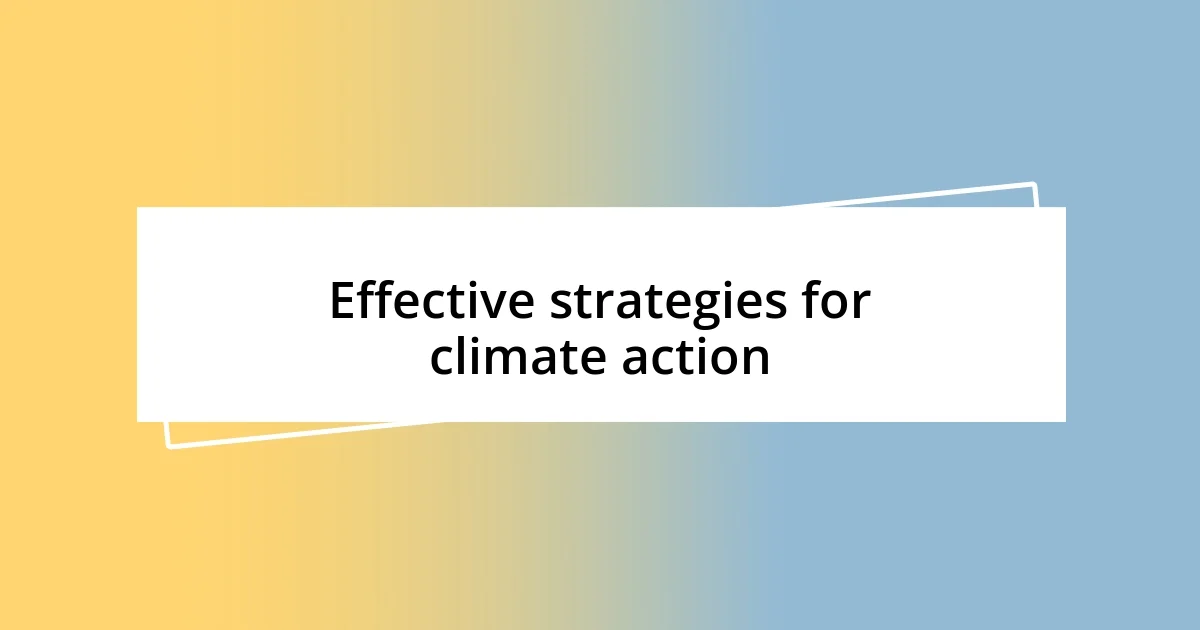
Effective strategies for climate action
Effective strategies for climate action require a blend of personal initiative and collective collaboration. I’ve learned that small, everyday choices can spark broader change. For instance, after attending a seminar, I decided to reduce my personal plastic consumption. Each reusable bag, bottle, or straw represents not just a choice but a statement about my commitment to a sustainable future. This experience drilled home the point that our individual actions, while they may seem trivial, contribute to a larger movement.
Here are some effective strategies that emerged from my engagements:
- Community Engagement: Mobilize local groups to work on environmental projects, fostering a spirit of teamwork and shared responsibility.
- Education and Awareness: Host workshops or informational sessions to spread knowledge about climate change impacts and solutions.
- Support Local Policies: Advocate for sustainable local policies, engaging directly with policymakers to make your voice heard.
- Sustainable Practices: Implement eco-friendly habits, such as composting or using public transport, in your daily life.
- Collaborative Initiatives: Partner with local businesses or schools to create programs that incentivize environmental stewardship.
Each of these strategies is an opportunity for personal growth and collective change. I was particularly moved during a session when a leader in community agriculture shared how his initiative not only promoted healthy eating but also brought people together to work towards a common goal. It was a moment of realization for me—climate action is as much about building community as it is about individual adjustments.
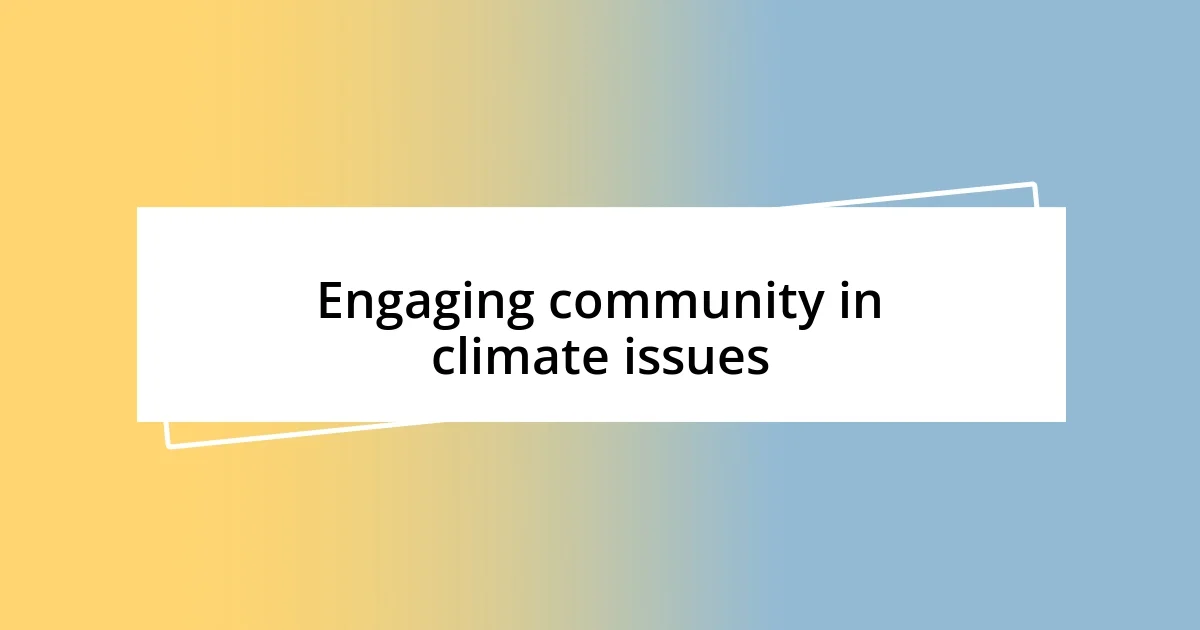
Engaging community in climate issues
Engaging the community in climate issues is incredibly powerful. I remember attending a workshop where participants shared their stories about local environmental challenges. One woman spoke about her neighborhood’s struggle with flooding due to climate change. Her passion was infectious; it made me realize how crucial it is to share our experiences to galvanize collective action. Have you ever considered how personal stories can move people to take action? They bring a human touch to abstract issues, making it easier for others to relate and get involved.
One initiative that really left an impression on me was a town hall meeting focused on sustainable urban planning. Community members came together, collaborating on ideas to reduce their carbon footprint. I watched as residents, who had never spoken about climate changes before, became animated discussing bike lanes and green roofs! It struck me how creating forums for open discussion can empower individuals to voice their opinions. When people realize their input matters, they’re more likely to participate actively in solutions.
Moreover, I’ve come to understand the importance of leveraging local resources to engage communities. During one seminar, I learned about a book club that exclusively focused on climate literature. The organizer shared how these meetings not only sparked meaningful conversations but also inspired action within the neighborhood. It inspired me to think about starting something similar in my area. What if we could explore climate issues through storytelling and research together? By connecting on a personal level, we can transform concern into collaboration and action.
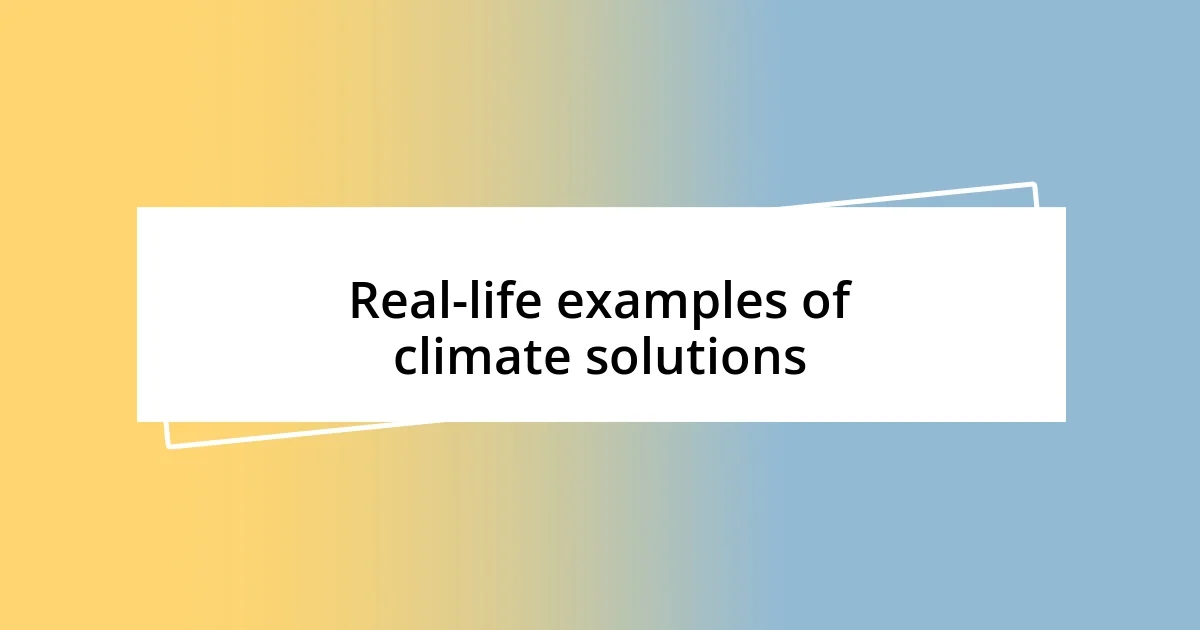
Real-life examples of climate solutions
One striking example of a climate solution I encountered was during a seminar where a group of students presented their project on urban gardening. They transformed a vacant lot into a vibrant community garden, and I could feel their excitement as they shared the story. It was more than just growing food; it was about fostering community resilience. Isn’t it amazing how something as simple as planting seeds can cultivate connections among neighbors? Watching them inspire others made me realize how hands-on efforts can ripple out to create lasting impacts.
Another inspiring instance was when I learned about a local initiative aimed at retrofitting homes for energy efficiency. A participant shared her journey of converting her old, drafty house into an energy-efficient sanctuary. She spoke about the financial savings and the pride she felt in cutting down her carbon footprint. Have you ever thought about how individual choices can lead to widespread change? This experience reinforced my belief that personal stories are powerful motivators and that even small actions taken at home can inspire a community shift toward sustainability.
Lastly, I was particularly touched by a program that pairs retirees with youth to teach skills like upcycling and sustainable crafting. Listening to the stories exchanged between generations painted a beautiful picture of connection and learning. It made me reflect: how often do we consider the wisdom and creativity that come from collaborating across age groups? Engaging the younger generation through practical skills not only empowers them but also builds a bridge of knowledge. That seminar left me with a clear understanding: climate solutions come alive when we weave our experiences and expertise together.
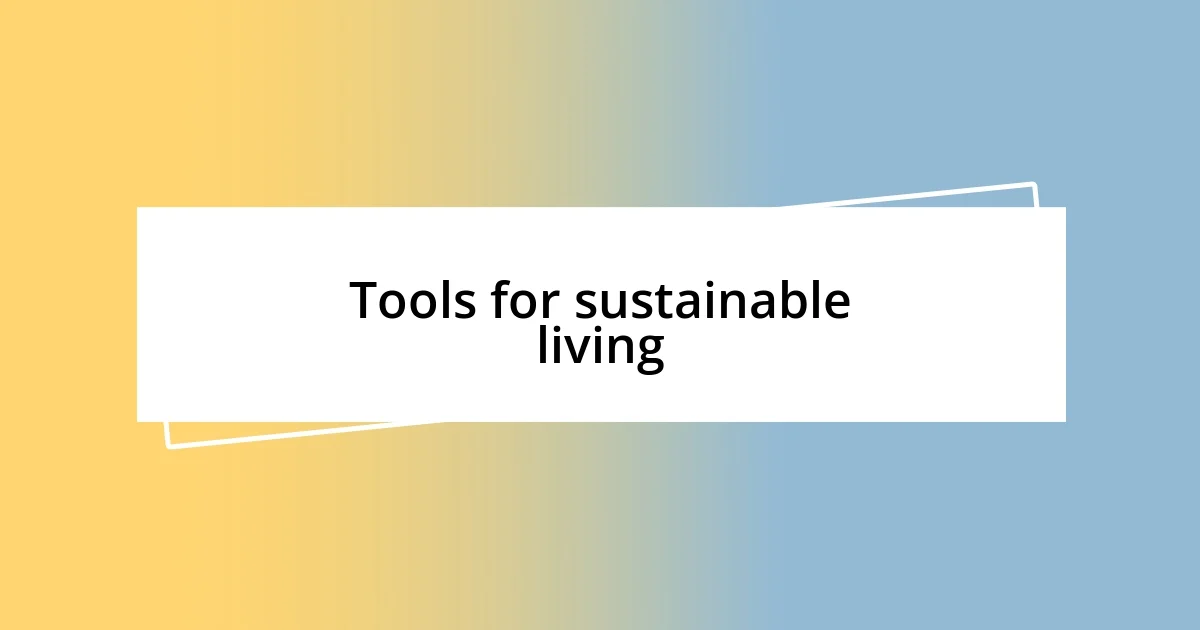
Tools for sustainable living
Tools for sustainable living can often be simple yet transformative. I realize that one of the most effective tools I’ve discovered is the zero-waste lifestyle. After committing to using reusable bags, bottles, and containers, I was shocked by how much my waste reduced. Have you ever thought about how such small changes can lead to significant impacts on our environment? It’s empowering to know that by choosing to refuse plastic, I’m contributing to a cleaner planet.
Another powerful tool for sustainability is energy monitoring apps. I remember when I first downloaded one; it helped me track my household energy usage in real-time. This insight opened my eyes to my energy habits. I began to recognize when I was wasting electricity—turning off lights, unplugging devices, and even adjusting my thermostat. Have you experienced this shift in consciousness? Once I understood my consumption patterns, I felt more in control and motivated to make more conscious choices.
Moreover, getting involved in local exchange programs has proven invaluable. I joined a tool-sharing group in my community, allowing me to borrow equipment instead of buying everything I think I need. It’s fascinating to see how much we can share and reduce redundancy. Can you imagine the sense of camaraderie that develops when neighbors come together to lend a helping hand? This simple act has turned my neighborhood into a supportive hub of resourcefulness while lessening our collective environmental footprint.
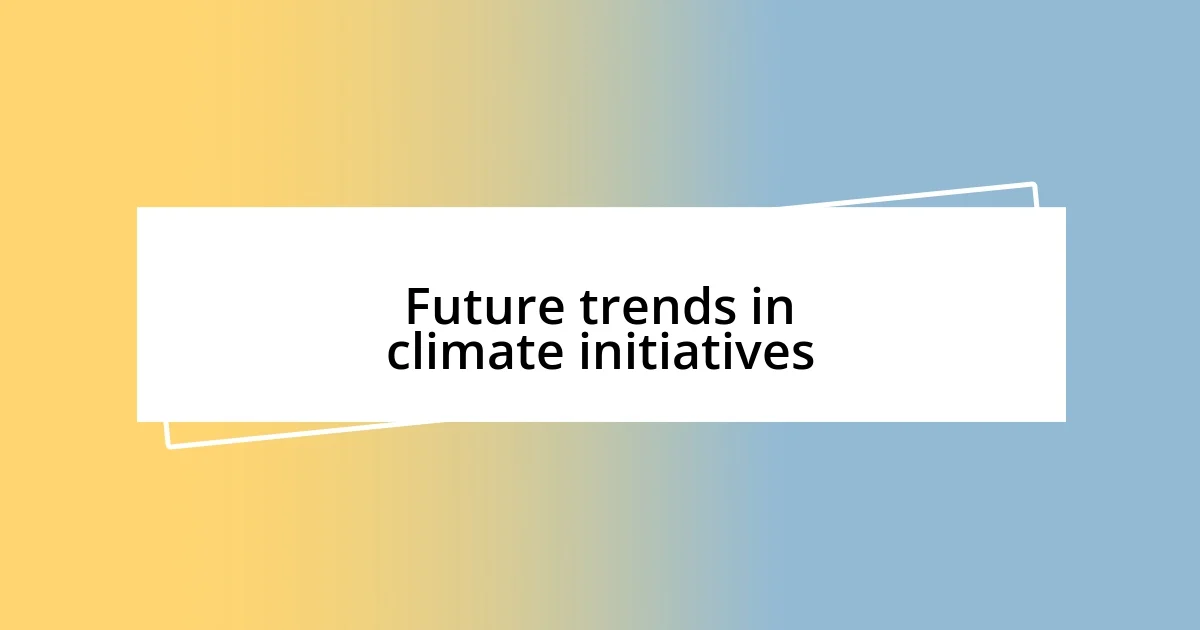
Future trends in climate initiatives
As I reflect on future trends in climate initiatives, I can’t help but notice an increasing emphasis on technology-driven solutions. In one seminar, I was introduced to innovative platforms that connect individuals and organizations working on climate action. Imagine a space where you can collaborate with like-minded people, sharing resources and strategies. Isn’t it exciting to think about how technology can break down barriers and accelerate collective efforts? This digital camaraderie offers a glimpse into a more connected and impactful future for climate initiatives.
What also struck me is the growing movement towards incorporating indigenous knowledge in climate strategies. I listened to a speaker who passionately shared how traditional ecological practices hold the key to sustainable living. It made me realize how much we could learn from the wisdom inherent in these age-old methods. Can you see how blending modern science with indigenous insights can create robust solutions? This integration not only honors cultural heritage but also provides proven pathways for resilience in the face of climate change.
Finally, I find it fascinating that community-driven projects are gaining momentum. I remember participating in a local initiative where we collectively decided to transition our neighborhood to renewable energy sources. Witnessing this grassroots movement was incredibly empowering. Have you considered how your community could embrace renewable energy? The sense of ownership and shared purpose made us all feel like we were part of something larger—working together toward a sustainable future. The potential impact of these local actions can truly be transformative, inspiring others to join the cause.

